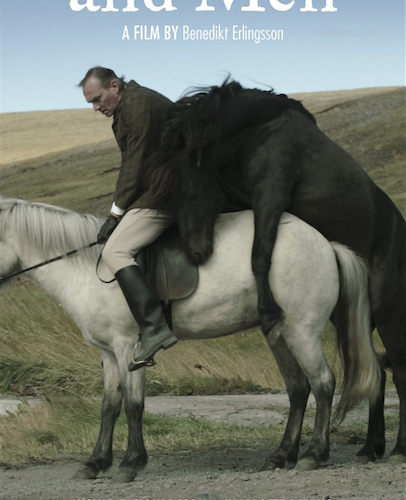Horses are a peculiar and versatile animal in that, through the 5,000+ years that they have been domesticated, they have held a place in the hearts of mankind as both companion and tool to an extent unmatched by other animals. They have been used for war, transportation, athletic events and recreation, but through it all there has always long been a relationship between rider and horse that there has not been with, for example, farm animals like chickens or oxen or for cats and dogs, which are friends often times friends but rarely accessories. The horse, despite having far more physical prowess than any human—or perhaps because of it, combined with their normal genteel nature—has long captured the hearts of men and women.
Of Horses and Men, the debut film of Benedikt Erlingsson, is about those relationships and their paradoxes, which are occasionally funny, but more often deal with sex and death of, as the name would lead one to believe, both horses and men. It consists of a handful of vignettes, sometimes handed off in a manner that recalls Chungking Express. One character will wander into the story or be happened upon by another, and the film will stick with them for 15 or 20 minutes—too short, frankly to hold any resonance on their own—before shifting gears again, or else we will cut abruptly to a close-up of a horse’s blinking eye to signal the start of a new tale. As such, there is remarkably little exposition, almost no stakes, and only occasional glimpses of what might quality as “conflict,” but there are still a number of surprisingly grim moments. A man is blinded by a barbed wire fence; another unwittingly rides his vehicle over a cliff; two horses are slaughtered for vastly different reasons, one of which is especially gruesome to watch.

Still, watching what these people go through to tame horses, along with Erlingsson’s clever, cinematic parallels (women and horse are looked at with similar close-ups; both are seen copulating through binoculars; orgasmic moans seamlessly transition to the sound of herding) reveals the central paradoxes of man-horse relations. On one hand, horses and men are startlingly similar creatures; on the other, the horses are largely indifferent to their owners, but despite their physical power, they stick it out simply because there is no reason not to. It’s telling that when a graphic depiction of sterilization begins with tranquilizing the beast. The act is central to human control but perhaps the only act the horse would outright disapprove of.
This is nothing particularly new—Robert Bresson’s Au Hasard Balthazar and František Vláčil’s Marketa Lazarová are probably the two most notable examples to say the same and much more—and the vignettes, despite smooth transitions, rarely converse with one another as much as they should. But there is something to be said for how beautifully Björgúlfsson captures Iceland’s exteriors, which make up almost all of the film. He captures the ocean, countryside, and the mountains exquisitely, and he and Erlingsson save the most memorable composition for the brief night time. Also of note is Davið þór Jónsson’s thundering score, and the sheer diversity within the story: characters of many different creeds and speaking many different languages all get their due relation with man’s greatest companion. Despite its simplicity, then, Of Horses and Men is nothing if not memorable, and it matches its missteps with commendable and thoughtful formal and stylistic prowess.
Of Horses and Men screened at New Directors/New Films. See the trailer above.

